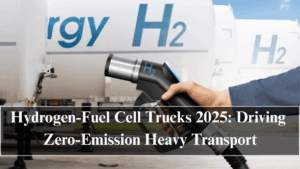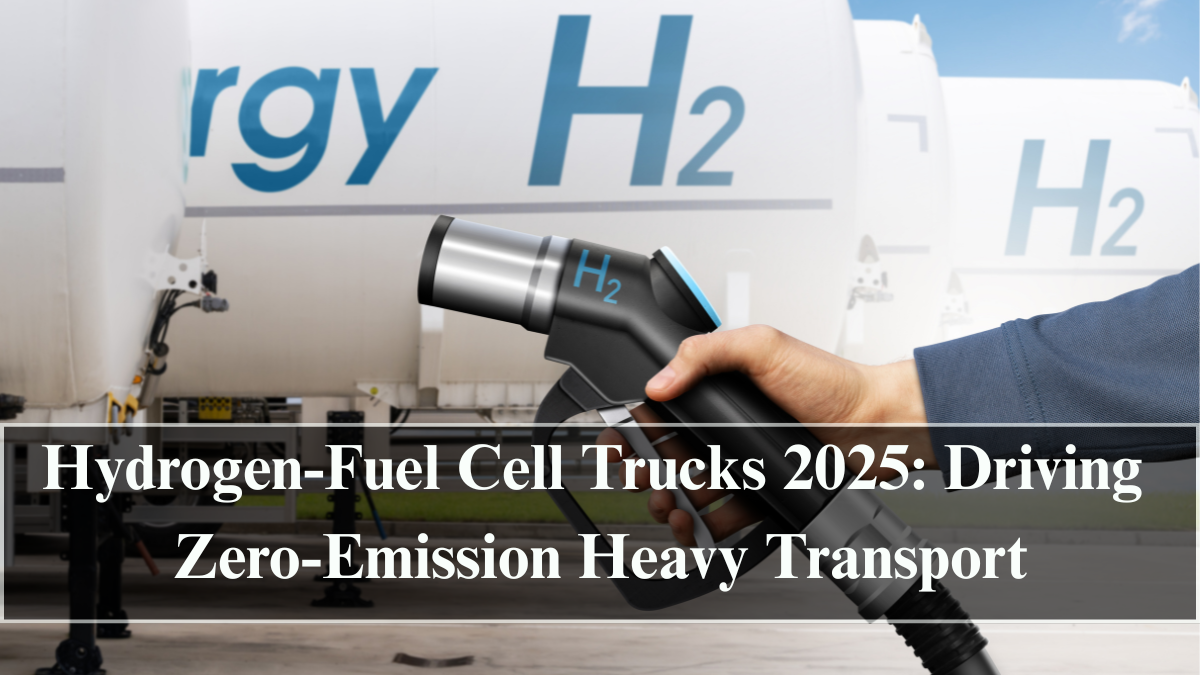In 2025, the global race toward zero-emission mobility has reached the heavy-duty segment, and Hydrogen-Fuel Cell Trucks are emerging as the most promising solution for long-haul logistics. While battery-electric trucks are ideal for shorter routes, hydrogen technology is proving more efficient for commercial fleets that require greater range, faster refueling, and continuous operation. By using fuel cells to generate electricity onboard, Hydrogen-Fuel Cell Trucks 2025 are redefining sustainability in the freight industry without compromising on power or payload.
The transportation sector, especially heavy trucking, has long been one of the largest contributors to carbon emissions. Diesel engines, despite their torque and endurance, release massive amounts of CO₂ and particulate matter. Hydrogen trucks eliminate this entirely by using compressed hydrogen as fuel, which, when combined with oxygen in a fuel cell, produces only electricity and water vapor as byproducts. This makes hydrogen the cleanest and most scalable energy source for decarbonizing long-distance freight transport.

How Hydrogen Fuel Cells Work in Heavy Vehicles
At the heart of a hydrogen truck lies a fuel cell stack — a device that converts hydrogen and oxygen into electricity through an electrochemical process. The electricity generated powers the truck’s electric motor, while the only emission is pure water. Unlike batteries, hydrogen tanks can be refueled within minutes, offering a key advantage for logistics operations that can’t afford long charging downtime.
Hydrogen-Fuel Cell Trucks 2025 typically feature high-pressure hydrogen tanks, advanced cooling systems, and regenerative braking to capture energy efficiently. With improved stack durability and thermal management, the latest trucks can achieve ranges exceeding 1,000 kilometers on a single fill — double the distance of many electric alternatives.
Advantages Over Battery-Electric Trucks
While both hydrogen and electric trucks contribute to clean mobility, fuel cell technology addresses several limitations of large battery systems. For instance, hydrogen tanks are lighter than massive battery packs, allowing higher payload capacity — a crucial factor for freight transport. Moreover, hydrogen trucks can refuel in just 10–15 minutes, compared to several hours of charging for full-size EVs.
Fuel cell trucks are particularly suited for routes that demand constant operation, such as cross-country logistics and port transportation. As renewable hydrogen production expands globally, operational costs are steadily decreasing, making hydrogen logistics increasingly viable and economically competitive.
Growing Infrastructure and Industry Adoption
A robust refueling network is essential for the hydrogen ecosystem to thrive. In 2025, several countries including Japan, Germany, and the United States are rapidly building hydrogen refueling corridors along major highways. Companies like Nikola, Hyundai, Toyota, and Volvo have already launched pilot fleets of fuel cell trucks that serve both commercial and municipal routes.
In India and Europe, governments are incentivizing hydrogen projects under clean energy transition programs. Refineries, steel plants, and renewable energy producers are joining forces to establish green hydrogen production using solar and wind power, ensuring a sustainable and domestic energy source for the future of heavy-duty logistics.
Technological Breakthroughs in 2025
The year 2025 has seen dramatic improvements in fuel cell efficiency and durability. New proton exchange membrane (PEM) technologies have doubled lifespan and reduced platinum content, making systems cheaper and more sustainable. Additionally, solid-state storage innovations have enhanced tank safety and energy density.
Leading research institutions and startups are working on hydrogen hybrid systems, combining batteries and fuel cells for maximum performance and range. These hybrid models optimize energy flow, using the battery for acceleration and the fuel cell for steady cruising — achieving remarkable efficiency even on demanding terrains.
Environmental and Economic Impact
The environmental advantages of Hydrogen-Fuel Cell Trucks 2025 go beyond tailpipe emissions. When powered by green hydrogen — produced via renewable electrolysis — the entire energy cycle becomes carbon-neutral. Fleet operators adopting these trucks are reporting up to 60% lower lifecycle emissions compared to diesel fleets, while also saving on long-term maintenance costs since fuel cells have fewer moving parts than combustion engines.
In addition, the growing hydrogen economy is generating jobs in energy production, transportation, and infrastructure development. As hydrogen production scales, the cost per kilogram is expected to drop below $3 by 2030, making fuel cell trucks even more accessible to global logistics operators.
The Road Ahead for Hydrogen Logistics
The road to mass adoption is underway, and by 2030, hydrogen-powered trucks are expected to dominate long-haul freight segments across North America, Europe, and Asia. Continued investment in refueling networks, green hydrogen production, and standardization will ensure their rapid expansion.
As the global economy shifts toward sustainability, Hydrogen-Fuel Cell Trucks 2025 represent the ultimate balance between range, power, and environmental responsibility. They are not only redefining heavy transport but also paving the way for an energy ecosystem where logistics run clean, efficient, and emission-free.
FAQs
What makes hydrogen-fuel cell trucks different from electric trucks?
Hydrogen trucks generate electricity onboard using hydrogen fuel cells, offering longer range and faster refueling compared to battery-electric trucks.
How long does it take to refuel a hydrogen truck?
Most hydrogen trucks can refuel in about 10–15 minutes, significantly reducing downtime compared to EV charging.
Are hydrogen trucks truly zero-emission?
Yes, they emit only water vapor as a byproduct, producing no carbon dioxide or harmful pollutants.
What is green hydrogen, and why is it important?
Green hydrogen is produced from renewable energy sources like solar and wind, making the entire fuel cycle carbon-neutral.
Which companies are leading in hydrogen truck development?
Major players include Nikola, Hyundai, Toyota, Volvo, and Daimler, all investing in fuel cell truck platforms and refueling infrastructure.
Click here to know more.
